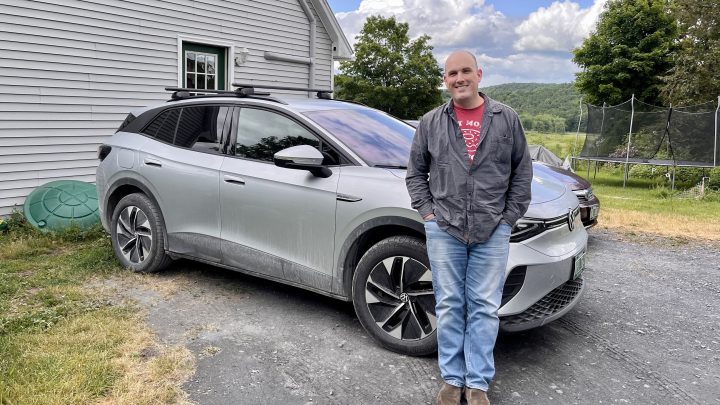
EVs are supersizing as carmakers roll out more electric SUVs and trucks
EVs are supersizing as carmakers roll out more electric SUVs and trucks

General Motors is rolling out a new line of electric vehicles in the next year or so. That includes electric versions of the Blazer, Equinox and Silverado. One thing they have in common? They’re all SUVs and trucks, and they’re a lot bigger than the company’s Chevy Bolt, which will end production this year.
GM’s not the only automaker moving towards larger EVs. According to the International Energy Agency, 60% of the EV models available in the U.S. last year were SUVs. It’s a trend that’s about offering Americans the kind of car they want to drive.
Those customers include Andy Purdy, a bookkeeper for a local school district who lives up a dirt road in the tiny town of Benson, Vermont.
“The dirt roads… here in Vermont can get very sloppy, messy, rutted, bumpy, slimy. I mean, pick your adjective,” Purdy said.
So, when Purdy and his wife started looking for an electric vehicle about two years ago, they quickly decided they needed a car on the larger side, with all-wheel drive and good road clearance. And it needed to accommodate his 6’3” frame.
“For me, having a large vehicle is a matter of comfort,” he said. “It’s also a matter of utility. We have… two kids, they’re into sports, they have the equipment, my wife likes to ski in the winter time.”
They ended up buying a Volkswagen ID.4, an electric SUV. It took a while to get delivered to them, but in the 11 months since the car arrived, it’s met all of the family’s needs, “without exception,” Purdy said. And it’s customers like Purdy that are driving the EV market these days.
“People are gravitating towards the SUVs because it fits the lifestyle, fits the driving, fits the climate conditions, it’s a safer vehicle, and you know, that’s what they like,” said Jesse Lore, the owner of a used car dealership in North Hampton, New Hampshire. The company exclusively sells EVs and plug-in hybrids. Lore said he’s seeing an increasing number of customers looking for larger electric vehicles. And they’re not like the first wave of EV adopters.
“So it’s not just the hardcore environmentalists, or the super tech enthusiasts that are looking for an electric vehicle,” Lore said. “It’s families with kids, it’s people who are retiring, it’s people who are looking for a better way to get to and from work every day.”
And automakers are trying to meet that demand, according to industry analyst Michelle Krebs at Cox Automotive — which is a Marketplace underwriter.
“Customers just prefer SUVs over cars,” Krebs said. “And so it is logical that automakers would go to the SUV market for their EVs because that’s where the customers are.”
Case in point: Tesla’s Model Y SUV is now the best-selling vehicle in the world, Krebs said. And GM, Toyota, Volvo, Ford, Honda and Kia, to name a few, are all getting into the electric SUV game.
“Almost every automaker has an electric SUV coming,” said Krebs.
But with larger vehicles come larger, and heavier, batteries.
“The batteries that power an electric SUV versus the batteries that power an electric sedan or an electric bike are just gargantuan in size,” said Thea Riofrancos, a political science professor at Providence College, who’s studied the environmental and geopolitical impacts of lithium mining.
Those bigger batteries require more lithium and other raw materials with supply chains that can cause environmental damage. Plus, big batteries make electric SUVs even heavier than their gas-powered counterparts.
“Which poses clear dangers to you know, folks crossing the street or to other cars, or bikes, that you’re sharing the road with,” Riofrancos said.
The Biden Administration has pegged a large part of its decarbonization policy on expanding the market for EVs. The goal: For half of new vehicles sold in 2030 to be electric. It’s not clear how quickly the market will get there from today’s figure of about 8%, according to Krebs.
“One of the stumbling blocks right now to EV sales is they are more expensive than gas-powered vehicles,” Krebs said.
While the cost gap has come down, it’s still on average about $10,000, according to Krebs. And electric SUVs are especially costly. The price tag for a Volkswagon ID.4 was a bit of a stretch for Andy Purdy and his family: Just shy of $50,000 after rebates.
“We knew we were paying more, we knew that we would not be paying for gas, but in the end, it might end up being a wash in terms of money,” said Purdy.
However, there’s another benefit he can’t put a price tag on.
“We like to joke that the other exhaust on a vehicle like this is smug,” he laughed. “We get to drive around, knowing that we’re not, you know, pumping emissions into the atmosphere and further damaging the environment.”
And he’s doing it in a car that’s big enough for him, his family and all their stuff, plus it can handle that dirt driveway.
There’s a lot happening in the world. Through it all, Marketplace is here for you.
You rely on Marketplace to break down the world’s events and tell you how it affects you in a fact-based, approachable way. We rely on your financial support to keep making that possible.
Your donation today powers the independent journalism that you rely on. For just $5/month, you can help sustain Marketplace so we can keep reporting on the things that matter to you.


















